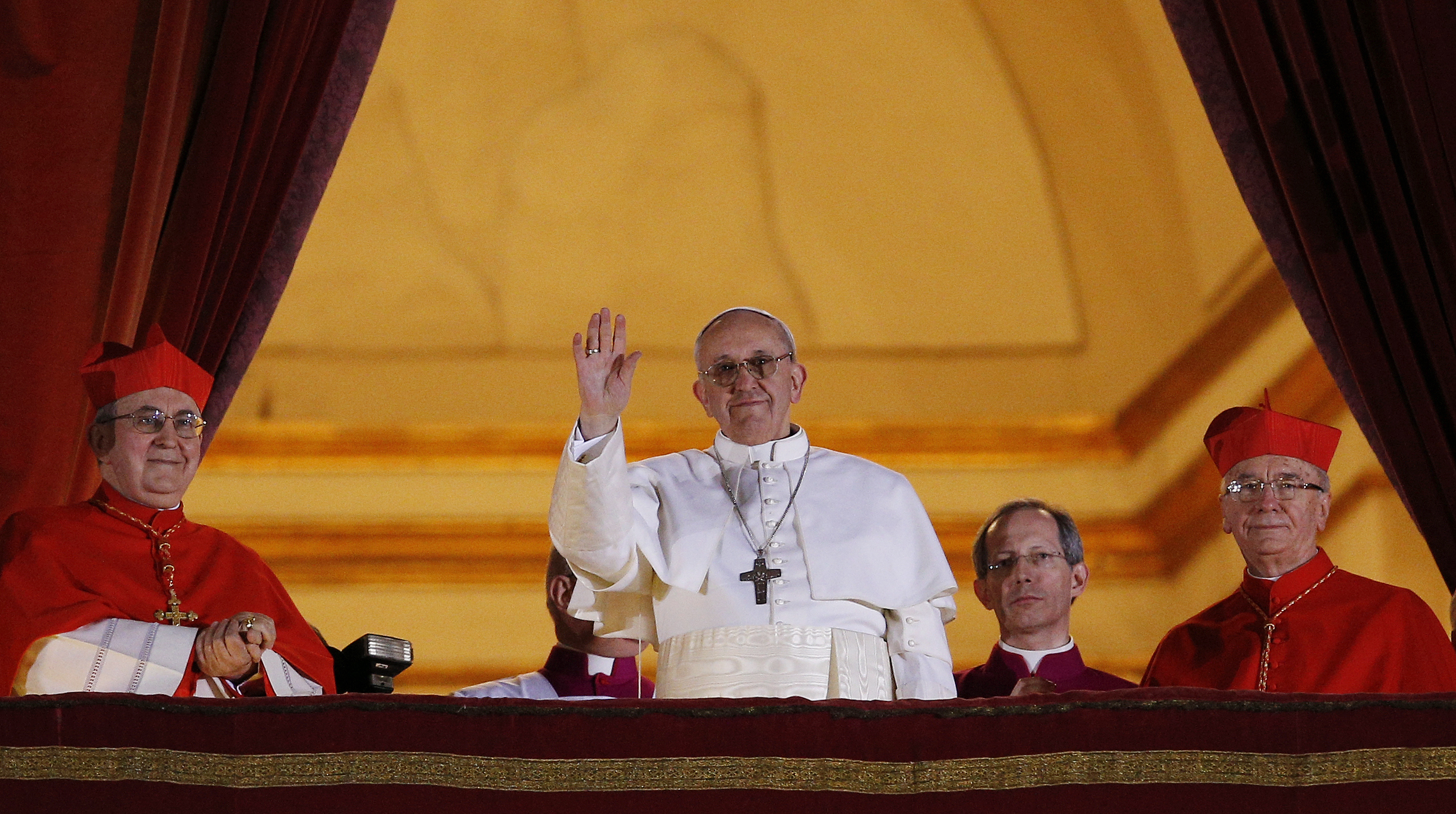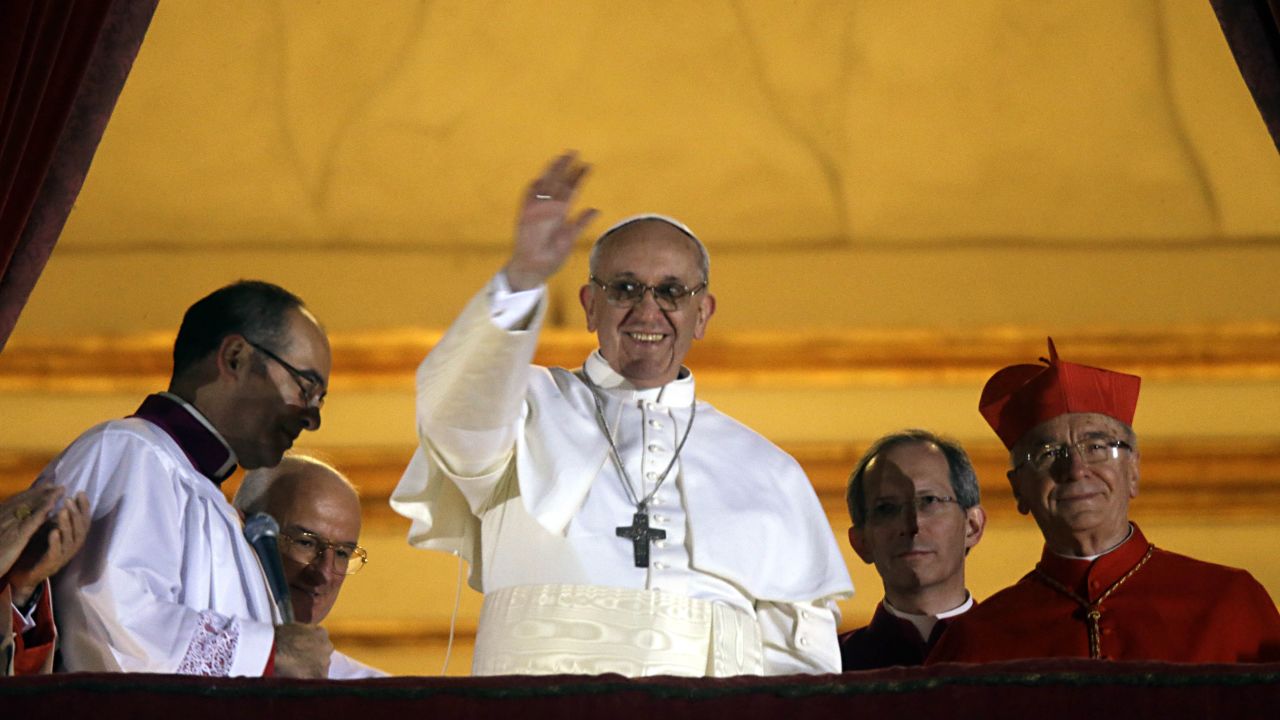Pope Francis: Key Facts About The Pope's Life & Election
Can you imagine a world where the leader of over a billion Catholics takes a name that reflects humility and service? Pope Francis, the 266th pontiff of the Roman Catholic Church, embodies this sentiment, offering a fresh perspective on faith and leadership.
The story of Pope Francis is, in many ways, a story of unexpected turns and unwavering faith. Born Jorge Mario Bergoglio in Buenos Aires, Argentina, on December 17, 1936, his journey to the papacy was marked by a commitment to service and a deep connection to the people. This man, who would become the first Pope from the Americas, the first from the Southern Hemisphere, and the first Jesuit to hold the position, entered the world at a time of global unrest, and his life's work would come to reflect a dedication to peace, justice, and dialogue.
On March 13, 2013, the world watched with bated breath as the conclave, the process by which the College of Cardinals elects a new pope, concluded. Following the resignation of Pope Benedict XVI on February 28, 2013, the cardinals gathered in the Vatican, seeking guidance in selecting the next leader of the Catholic Church. The process, steeped in tradition and secrecy, culminated in the election of Cardinal Jorge Mario Bergoglio, the Archbishop of Buenos Aires. On the fifth ballot, the decision was made. At the age of 76, he accepted his election and took the name Francis, a gesture of humility and a nod to St. Francis of Assisi.
His election signaled a new chapter for the Church. Pope Francis, a man known for his simple lifestyle and his focus on the marginalized, immediately began to make an impact. He chose to live in a modest apartment rather than the papal palace, and he prioritized meeting with ordinary people over maintaining the trappings of power. His words and actions emphasized themes of mercy, compassion, and social justice, resonating with a global audience.
| Category | Details |
|---|---|
| Full Name | Jorge Mario Bergoglio |
| Born | December 17, 1936, in Buenos Aires, Argentina |
| Parents | Mario Jos Bergoglio and Regina Mara Svori |
| Nationality | Argentine (by birth), Vatican City (as Pope) |
| Religious Order | Society of Jesus (Jesuits) |
| Ordained as Priest | December 13, 1969 |
| Ordained as Bishop | June 27, 1992 |
| Created Cardinal | February 21, 2001, by Pope John Paul II |
| Elected Pope | March 13, 2013 |
| Papal Name | Francis |
| Predecessor | Pope Benedict XVI |
| Known For | Emphasis on mercy, social justice, and environmental concerns; first Pope from the Americas; first Jesuit Pope. |
| Key Actions | Laudato Si' (encyclical on environmental care), efforts to promote interfaith dialogue, focus on the poor and marginalized. |
| Significant Events | Resignation of Pope Benedict XVI, Conclave of 2013, numerous international trips. |
| Website for Reference | Official Vatican Website - Pope Francis |
The election of Pope Francis was not merely a change in leadership; it was a shift in tone and emphasis. His pontificate has been characterized by a willingness to engage with contemporary issues, from climate change to economic inequality, to the sexual abuse crisis within the Church. He has consistently advocated for the poor and vulnerable, urging the Church to be a "field hospital" for those in need of healing.
His impact is undeniable. His messages of inclusion and dialogue have reached across religious and cultural divides. He has worked tirelessly to build bridges with other faiths and to foster a spirit of understanding in a world often fractured by conflict. His travels to various countries have served to underscore his commitment to global peace and his desire to connect with people from all walks of life. His stance on immigration, his call for greater economic justice, and his encyclical Laudato Si on the environment have solidified his place as a leader who is not afraid to confront the challenges of the 21st century.
The process of electing a pope, the conclave, is a fascinating and often secretive affair. After the death or resignation of a pope, the College of Cardinals, those cardinals under the age of 80, convene in the Sistine Chapel. They pray, deliberate, and vote until a new pope is chosen. The process is steeped in tradition, with procedures dating back centuries. The cardinals are secluded from the outside world, and the ballots are burned after each round of voting, with black smoke indicating no decision and white smoke signaling the election of a new pope.
Before his election, Cardinal Bergoglio was known for his humility and his dedication to the people of Buenos Aires. He lived a simple life, taking public transportation and cooking his own meals. As Archbishop, he was known for his pastoral outreach and his efforts to reach out to the poor and marginalized in the city.
Pope Francis's papacy has been marked by several significant actions. His reforms of the Vatican Bank, his efforts to address the clergy sexual abuse scandal, and his encouragement of greater participation by lay people in the Church's governance are a testament to his commitment to change. His encyclicals, such as Laudato Si' and Fratelli Tutti, have addressed pressing global issues and have offered a vision of a more just and sustainable world.
The date of March 13, 2013, is etched in history as the day when the Roman Catholic Church welcomed a new leader. The world watched as Cardinal Jorge Mario Bergoglio, the Archbishop of Buenos Aires, emerged onto the balcony of St. Peter's Basilica, taking his place as the 266th pontiff. At the age of 76, he was elected after the resignation of Pope Benedict XVI, ushering in a new era of leadership and signaling a shift in direction for the global Church. His papacy has been defined by his embrace of social issues, his focus on mercy, and his commitment to building bridges with the world.
Pope Franciss date of birth, December 17, 1936, holds the key to understanding the man. It tells us the context, the era he was born in, the world he came into, the history that shaped him. The fact that he was elected at the age of 76, underlines his experience, his wisdom, and the perspective he brings to the papacy. His election came after Pope Benedict XVI's resignation on February 28, 2013, a significant event in the history of the papacy and the Catholic Church. The conclave that followed, beginning on March 12, 2013, saw the cardinals choosing Cardinal Jorge Mario Bergoglio, the Archbishop of Buenos Aires, Argentina. The news reverberated globally. He became the first pope from the Americas, the first from the Southern Hemisphere, and the first Jesuit to hold the office.
The election of Pope Francis was a historic moment. He became the 266th pope, carrying the weight of centuries of tradition and responsibility. He chose the name Francis in honor of St. Francis of Assisi, a symbol of humility, simplicity, and service to the poor. His papacy has been shaped by his commitment to these ideals, and by his progressive views on social and economic issues.
The choice of the name 'Francis' itself, speaks volumes. It is a clear signal of his priorities: to embrace simplicity, to serve the poor, and to be a bridge-builder. His efforts in promoting unity between different groups, fostering dialogue with people of different faiths, and advocating for social justice issues are all hallmarks of his papacy.
The world has watched as Pope Francis has met with many world leaders. These meetings have served not only to further the Church's diplomatic efforts, but also to foster a spirit of cooperation and understanding in a world that often seems divided. His efforts to unite Catholics and non-Catholics, to address social issues, and to advocate for the environment have been consistent throughout his papacy. Pope Francis is a figure who inspires, and his actions continue to shape the world.
Pope Francis has made significant contributions to the Catholic Church and the world. His emphasis on compassion, his efforts to address the global climate crisis, and his commitment to social justice are shaping our understanding of the Church's role in the 21st century. He has shown the world how faith can translate into action and how the message of the Gospel can be applied to the complex problems that humanity faces today.


